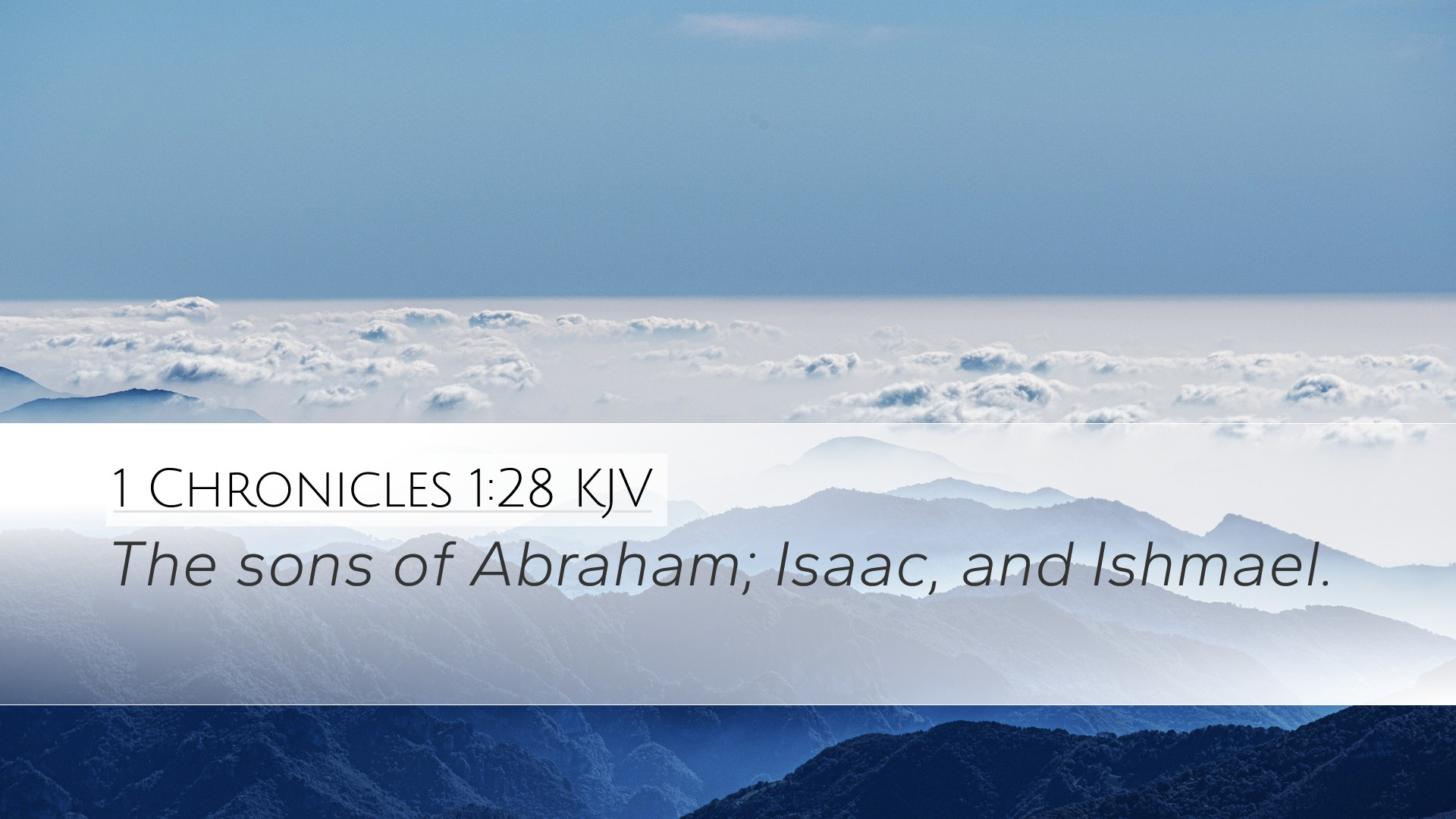Commentary on 1 Chronicles 1:28
Verse Text: "The sons of Abraham: Isaac and Ishmael." (1 Chronicles 1:28)
Introduction
This verse serves as a foundation for understanding the lineage of the patriarch Abraham, highlighting the significance of Isaac and Ishmael. Commentaries from Matthew Henry, Albert Barnes, and Adam Clarke provide insight into the theological implications and historical contexts of this verse.
Historical Context
Abraham is renowned as the father of many nations, and this verse references two pivotal figures in his genealogy. The lineage and descendants of Abraham not only shape the narrative of the Old Testament but also hold vital importance in the context of God's covenant with humanity.
Importance of Lineage
-
Matthew Henry's Perspective: Henry emphasizes the significance of genealogies, stating they serve to reinforce God's promises and sovereign choices in electing His people. Abraham’s sonship is marked by divine purpose.
-
Albert Barnes' Commentary: Barnes notes that this genealogical record positions Abraham as a pivotal figure of faith, whose offspring are of great historical and spiritual importance. He recognizes both sons as key players in fulfilling God's plans.
-
Adam Clarke's Insights: Clarke elaborates on the distinctions between Isaac and Ishmael, underscoring the differing paths of their respective descendants. He relates their stories to broader themes of divine election and grace.
The Sons of Abraham: Their Significance
Isaac: The Child of Promise
Matthew Henry: Henry identifies Isaac as the child of promise, born to Abraham and Sarah through God's miraculous intervention. Isaac's life exemplifies faith and obedience to God’s covenant, making him a crucial link in the genealogy leading to Israel.
Albert Barnes: Barnes affirms Isaac's position as the sole heir to Abraham’s promises. He highlights Isaac's role in further establishing the covenant relationship with God, noting that Isaac’s life signifies the continuation of divine promises.
Adam Clarke: Clarke focuses on Isaac's character, illustrating his faithfulness and exemplifying the obedience that God desires from His covenant people. Clarke also discusses how Isaac symbolizes hope and future blessings through divine promises.
Ishmael: The Son of the Flesh
Matthew Henry: In contrast, Henry describes Ishmael as a product of human attempts to fulfill God's promises, signifying the futility of relying on fleshly endeavors. Ishmael’s story serves as a warning against impatience and self-reliance.
Albert Barnes: Barnes remarks on the role of Ishmael as a reminder of God's mercy, stating that although Ishmael was not the child of the covenant, God still cared for him and his descendants, which presents a significant theological concern: God's love transcends specific covenants.
Adam Clarke: Clarke discusses Ishmael's destiny, noting that his lineage represents nations beyond Israel, suggesting that God's providence extends to all people, regardless of covenant status. This highlights the universal aspects of God's oversight.
Theological Implications
The dichotomy between Isaac and Ishmael raises essential theological questions regarding covenant, grace, and predestination. The inclusion of both figures in the genealogy illustrates God's intricate plan for humanity and the unfolding of His redemptive narrative.
Divine Election
-
Matthew Henry: Stresses that God's election is not based on human merit but on His sovereign will. This reinforces notions of grace as an unearned favor from God, exemplified in His choice of Isaac over Ishmael.
-
Albert Barnes: Barnes points out that God's election can lead to complex familial relationships and outcomes. Ishmael’s rejection does not preclude God's compassion toward him, which invites discussions on God’s justice and mercy.
-
Adam Clarke: Clarke emphasizes the broader implications of divine election, suggesting that while Isaac holds the covenantal promise, the existence and fate of Ishmael invite believers to contemplate God's justice intertwined with His mercy.
Conclusion
1 Chronicles 1:28 succinctly encapsulates the beginnings of a transformative lineage within the biblical narrative. The genealogical entry of Isaac and Ishmael not only serves to trace Israel's ancestry but also enriches our understanding of God's complexity in selecting His people. Pastors, students, theologians, and scholars must consider the rich implications of this verse, reflecting on themes of promise, election, and divine grace that transcend historical and cultural contexts.


